
Find out about common eye problems and what can be done to treat them. If you are experiencing any of the listed symptoms or have any questions about your eye health, we’d be happy to help address your concerns.

Nearsighted people can see objects up close, but distant objects are a blur.

Farsighted people are able to see objects at a distance but have poorer vision up close.

Astigmatism is a type of refractive error where there is a problem with your eye focusing light. Instead of light converging on a single point on the retina to produce a clear image, there are multiple focus points either in front of the retina or behind it (or both) causing blurry vision. Optometrists are able to determine any astigmatism you may have and write a prescription to correct your refractive error.

Presbyopia is the gradual loss of our eyes’ ability to focus on nearby objects. As we age, the lens becomes less flexible and so it becomes more difficult to focus properly. Generally, presbyopia becomes noticeable in the early to mid-40s and continues to worsen until around age 65. While age is the greatest risk factor for this common condition, there are many other causes such as being farsighted, having diabetes or taking certain medications.

Dry eyes occur when your tears cannot provide enough moisture or lubrication for your eyes.There are many reasons your eyes can become dry, including not producing enough tears or if your tears are of poor quality. Dry eyes feel uncomfortable and treatments may involve a change of lifestyle and eyedrops.

Itchy, red, swollen, watery eyes can all be signs of eye allergies. During allergy season, they are often caused by the same irritants that make you sneeze and have a runny nose such as pollen, dust, mould and pet dander. Allergy season starts as early as January and can last until November.

Inside the eyeball there is a clear lens that provides the power to help us focus. As we age, the lens becomes cloudy due to UV absorption and environmental factors. In the early stages of cataract development, changes in glasses prescription can solve the focussing issue. As the cataract matures, surgery can be performed by an ophthalmologist to remove the cloudy lens and replace it with a clear artificial lens. Cataracts can occur at any age, however typically it is found in patients over the age of 65.

Glaucoma is a silent eye condition where an increase in eye pressure causes compression to the optic nerve. Patients with early glaucoma are asymptomatic, but as the disease progresses it will lead to a loss of your peripheral vision and eventually your central vision. Glaucoma can be prevented and treated if diagnosed at an early stage. There are many risk factors for developing glaucoma such as age, race and family history. Your optometrist will screen for glaucoma at every routine eye exam.

Macular degeneration is a progressive damage of the macula; a sensitive area of the retina that is responsible for our central vision. There is currently no treatment to stop macular degeneration. Once macular degeneration is diagnosed we can take certain measures to help prevent the progression of the disease. Macular degeneration is one of the leading causes of vision loss in patients over the age of 65. This disease can also be hereditary. It is important to have an optometrist detect for early signs of this disease.

The retina is a layer at the back of the eyeball containing cells that are sensitive to light and trigger nerve impulses through the optic nerve to the brain. This is how we see. A tear or detachment of the retina can cause you to see sudden flashes of light, floaters, and blocked vision. If you experience any of these symptoms suddenly, please contact an optometrist immediately.
OR CALL 647.345.3833

If you’re over the age of 40, we highly recommend examining your eyes at least every two years for early identification and treatment of Glaucoma, Age-related Macular Degeneration (AMD), Cataracts and Diabetic Retinopathy
A comprehensive eye exam takes about 60 minutes.
Please bring your current eyeglasses, contact lens boxes and a pair of sunglasses.
We’ll check your eyeglass prescription, conduct a digital retinal scan and run a dilating fundus exam to determine the health of your eyes.
Vision coverage is often provided with extended health benefits. We are able to bill specific insurance companies directly – please call us to inquire.
Please note pupillary distance (PD) measurements are not part of an eye health examination. We are happy to help you with this service for an additional fee should you require it. Please let us know at the time of booking.
For patients over the age of 65, eye exams are covered by OHIP once a year. The same tests are performed as the adult eye exam to ensure continued eye health and enable early detection and diagnosis of any eye diseases more common in later years.
An eye exam for seniors takes 45 – 60 minutes.
Please bring your OHIP card, current eyeglasses, contact lens boxes, a pair of sunglasses and a list of your current medications.
OHIP covers an annual eye exam for seniors 65 and over. Please note that retinal photos are not covered under this plan.


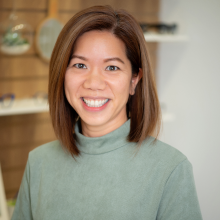
Born and raised in Toronto, Dr. Brenda Li graduated from Pennsylvania College of Optometry in Philadelphia and completed her undergraduate studies at University of Toronto, majoring in Pharmacology. She has received extensive training in diagnosing and treating eye diseases while completing her internship at The Eye Institute in Philadelphia, externships at the Veteran’s Affair Medical Center in Connecticut and at the Indian Health Services Clinic in Alaska.
She is certified by the Board of Examiners of Optometry in Canada and the use of Therapeutic Pharmaceutical Agents and accredited in the United States by the National Board of Examiners in Optometry and the Treatment and Management of Ocular Diseases.
Dr. Brenda Li is an active member of the Ontario Association of Optometrists, Canadian Association of Optometrists, Vision Therapy Canada, College of Optometrists in Vision Development, and a quality assurance (QA) assessor at the College of Optometrists of Ontario.
Dr. Brenda lives in Davisville Village with her husband, son and daughter. She is proud to be working and helping the people in the neighbourhood she calls home. In her spare time, you will find her enjoying the local parks and library with her children.
Dr. Brenda would like to extend a warm welcome to all the new patients at the practice. Come see what our beautiful neighbourhood practice has to offer.

Dr. Cassandra Ng received her Bachelor of Science degree in Biomedical Sciences from the University of Waterloo and her Doctor of Optometry degree from the Pennsylvania College of Optometry at Salus University in Philadelphia.
During her studies at the Pennsylvania College of Optometry, she completed clinical rotations in the Veterans Hospital in Orlando and with a large ophthalmology clinic in Maryland, working closely with several of the clinic’s ophthalmologists specializing in anterior segment disease, uveitis, and oculoplastics.
After earning her Doctor of Optometry degree, Dr. Ng completed a residency in Pediatric Optometry and Vision Therapy at the Pennsylvania College of Optometry. She is an active member of the College of Optometrists of Ontario, the Ontario Association of Optometrists, the Canadian Association of Optometrists, the College of Optometrists in Vision Development, and the Canadian Optometrists in Vision Therapy and Rehabilitation.

Dr. Izumi Yamamoto received her Doctor of Optometry degree from the University of Waterloo upon completing a Bachelor of Medical Sciences at the University of Western Ontario. Her training included an externship in ocular disease and therapeutics at the Lexington Veterans Affairs Medical Centre in Kentucky where she gained experience managing ocular conditions such as diabetic retinopathy, glaucoma, age-related macular degeneration, cataracts, and dry eyes. She is currently a member of the College of Optometrists of Ontario, Ontario Association of Optometrists, and Canadian Association of Optometrists.
She has volunteered abroad to provide optometric care in Peru and Honduras and also enjoys volunteering within her community. She has provided eye exams to newly resettled refugees in Kitchener, Ontario and has partaken in vision screenings for Special Olympic athletes and underserved communities within the GTA.
Her clinical interests include dry eyes, ocular nutraceuticals, paediatrics, and myopia control. In her spare time, she enjoys travelling, cooking, and exploring the city she is proud to call home. She is fluent in English and Japanese and looks forward to providing eye care to the Davisville community.

Dr. Kopikaa Easwaran received her Doctorate of Optometry degree from the University of Waterloo, following her Bachelor of Medical Science from Western University. Dr. Easwaran was awarded the Ontario Association of Optometrists Award for Excellence in Patient Management at graduation. During her internships, Dr. Easwaran received extensive training in diagnosing and treating ocular conditions such as age-related macular degeneration, diabetic retinopathy, glaucoma and dry eyes. She is currently an active member of the College of Optometrists of Ontario, the Ontario Association of Optometrists and the Canadian Association of Optometrists.
Dr. Easwaran is passionate about patient awareness and education that engage the community. She has initiated local community outreach events to educate young families and students on the importance of regular eye exams. She has also participated in humanitarian optometric services abroad to provide eye exams in Spanish Town, Old Harbour and Montego Bay, Jamaica.
Her areas of focus include dry eyes and pediatrics. When not seeing patients, Dr. Easwaran enjoys travelling, crafting and baking!

Born and raised in Toronto, Ada received her Bachelor of Science degree from the University of Toronto and completed her Opticianry degree from Georgian College.
Ada has been fitting glasses in the neighborhood since 2007. She is friendly and passionate about what she does. Ada has the eye for style and comfort to fit every individual’s needs. She will fit you with the perfect frame that expresses your “eyedentity”.
Ada enjoys spending time working on the window displays and finding the next new trend in fashion eyewear for the office.
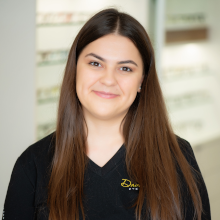
Laura completed her Opticianry program at Seneca College. She is friendly and patient. Laura is looking forward to give her clients a new look and help them see the world more clearly. In her free time, Laura enjoys spending time with her family and friends.
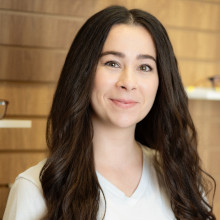
Nicole graduated from York University with her bachelors for Kinesiology and Health Science. In and out of school Nicole has been involved in developing fitness and health programing for people of all ages but has a passion for working with kids. Her many years of teaching dance and contributing to extended elementary and high school programing has developed her skill in working with kids and putting a creative twist on activities. Her keen interest in health, passion for teaching and love of kids had led her to Davisville Eye Care where she can help people in their daily lives by optimizing their visual skills.

Savannah graduated with a BSc in Psychology and Health Studies from University of Toronto. She has had experience working in a diverse field of settings including non-profit organizations, retail, the government sector, and insurance.
You will find Savannah at the main office and in our therapy room. She’s often greeting patients with her friendly smile, and helping patients improve their visual skills through vision therapy. Savannah volunteers at a sports physiotherapy clinic, at a centre for autism and her local church as a teacher’s assistant. She enjoys working with people of all ages, but most especially kids. She loves taking part in the creative learning process of a child and is always willing to work hand in hand with them. She hopes to make a difference in the world by helping out one child at a time “see” their true potential.
Savannah is an avid coffee drinker and enjoys travelling and long nature walks. You can also find her with a camera, reading a book or writing poetry during her spare time.

Daisy has been in the eyecare industry for many years. She greets everyone with her cheerful presence, making our patients feel welcome and comfortable the moment they walk in. She brings her energetic and outgoing personality to work everyday providing all of our patients with the utmost in professional healthcare. Not only is patient care important but she also loves to see our staff having fun and enjoying their jobs. A happy work family makes it a great pleasure coming into the office everyday.

Armela graduated with a master degree in medical laboratory and biotechnology. She has experience working closely with patients for over 9 years. Armela dedicated the past 4 years, not only learning every facet of optometric dispensing, but to provide patients with exceptional care. She also goes the extra mile for her patients and her team. Armela enjoys the outdoors,spending time on a sunny day with family and friends

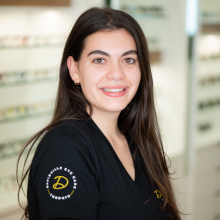
Born and raised in Toronto, Vanessa has a behavioural science diploma from Seneca College. She loves spending her free time with friends and family. She enjoys keeping up with the latest fashion and trends. She would love to help you find your next pair of frames.

Zoë is a proud holder of a bachelor in fine arts from OCAD University. Her field of study was heavily focused on art and the body including practices of life sculpting, medical illustration and studies of the post-human. She has a background in aquatics and has taught various levels of swimming since attending highschool. Prior to joining the DEC team, she worked as an aquatic supervisor and aquatic fitness instructor. Given Zoë’s background in fine arts and years of experience working with children, she brings a creative eye to DEC’s Vision Therapy team.
Zoë has a great interest in visual development and how we visually perceive the world around us. She believes greatly in the importance of developing visual skills, especially at an early age. When she isn’t working with eyes, she switches over to the great use of her ears – producing and recording music for herself as well as other musicians and content creators all over the GTA.

Dayle received her Master of Science in Clinical Mental Health Counseling from Plymouth State University, New Hampshire. Prior to Dayle’s graduate studies, she received her Bachelor of Arts majoring in Sociology and minoring in Sports Studies and Exercise Science from St. Lawrence University, Upstate New York. While completing her undergraduate degree, Dayle played NCAA Division I ice hockey for the St. Lawrence University Women’s Ice Hockey team.
Dayle worked as a Registered Psychotherapist for over 3 years, with a concentration in Cognitive Behavioural Therapy. She truly enjoys helping others improve the quality of their lives, which led her to Davisville Eye Care’s Vision Therapy program. Dayle also has a passion for athletics and is an Associate Coach for the U18 Toronto Aeros girls ice hockey team. In her spare time, she enjoys spending time with her family, friends and her animals.
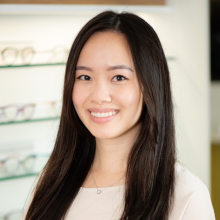
Dr. Bethany Lo received her Doctor of Optometry degree with Dean’s Honours from the University of Waterloo School of Optometry following her Bachelor of Science with an Honours Specialization in Neuroscience from the University of Western Ontario.
Dr. Lo completed her ocular disease externship at an ophthalmology clinic in Newmarket, Ontario, where she received extensive training in diagnosing and treating eye diseases. She also completed a clinical externship at a local primary care clinic, where she developed skills and a special interest in myopia control, contact lenses, and dry eye management.
She is currently a member of the College of Optometrists of Ontario, the Ontario Association of Optometrists, and the Canadian Association of Optometrists.
In her free time, Dr. Bethany enjoys traveling, cooking, trying new restaurants, and spending time with her family and friends.

Dr. Rim Tarzi received her Bachelor of Science degree in Life Sciences from McMaster University and later her Doctor of Optometry degree from the Southern College of Optometry in Memphis, Tennessee. She has received training in diagnosing and treating a myriad of eye diseases while interning in Memphis, Kentucky, and Ottawa under talented optometrists and ophthalmologists practicing in all disciplines of eye care.
Dr. Tarzi is accredited by the Ontario college of optometrists to prescribe therapeutic pharmaceutical agents and in the United States by the National Board of Examiners of Optometry to treat and manage ocular diseases. She is an active member of the Ontario Association of Optometrists.
Dr. Rim has lived in multiple cities in her life but she has proudly called Toronto her home since 2003. When she’s not caring for eyes, Dr. Rim enjoys traveling, cooking, and spending time with her friends and very large extended family.
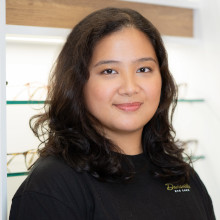
Josie has a wide variety of work experience, including retail, non-profit work, and eye care administration. She is typically found at our front desk or in the pretesting area, working hard to ensure patients have a pleasant experience in our office. She is passionate about supporting patients who have to navigate potentially complex healthcare systems by making processes accessible and understandable.
In her spare time, Josie enjoys sending funny videos to her friends and learning various crafts, focusing especially on ceramics. She also practices Muay Thai for fitness.
With the new restrictions announced, we’re still here to take care of your vision and eye care needs. Our goal is to provide our patients with the best eye care experience while keeping you as well as our team members safe at all times.
PLEASE NOTE:
We are restricting the number of people in the office at any given time
Masks are required for all patients and team members
Stringent disinfecting of our clinic between patients and throughout the day
Call us at 647-345-3833 or email info@davisvilleeyecare.com today and we’ll be happy to answer your questions about how we’re working to take care of your eye health and vision needs while keeping you safe.
All services are BY APPOINTMENT ONLY
We provide direct shipping of contact lenses and curbside pick up.
Stay safe and healthy!
~ the Davisville Eye Care Team
© Davisville Eye Care | All rights reserved